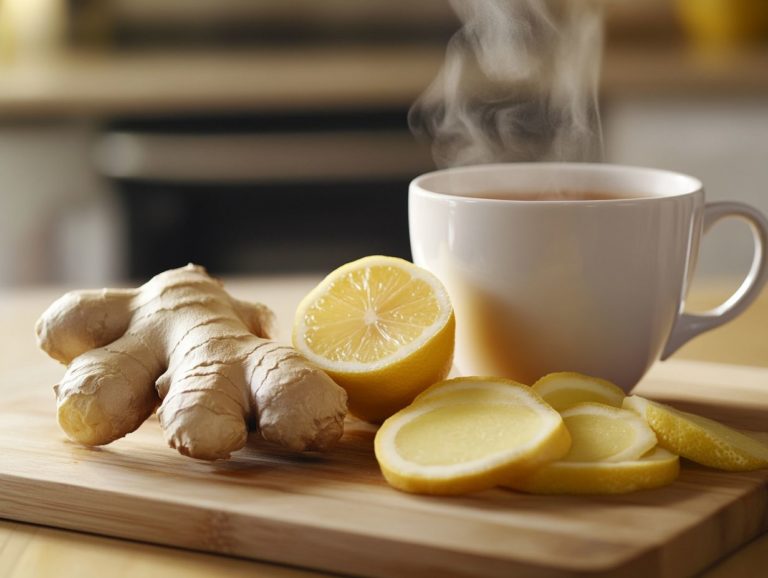5 Herbal Remedies for Headaches
Headaches can be an incredibly frustrating and debilitating experience, often prompting you to seek quick relief. While many people reach for over-the-counter medications as a go-to solution, an increasing number are exploring natural alternatives.
This article introduces you to five effective herbal remedies Peppermint Oil, Ginger, Feverfew, Butterbur, and Willow Bark that may provide you with the relief you seek.
It also delves into the various causes of headaches, the safe usage of these remedies, potential side effects, and how they stack up against conventional treatments.
Join us on an exciting journey to discover natural ways to beat headache pain!
Contents
- Key Takeaways:
- 1. Peppermint Oil
- 2. Ginger
- 3. Feverfew
- 4. Butterbur
- 5. Willow Bark
- What Causes Headaches and How Do Herbal Remedies Help?
- Frequently Asked Questions
- What are the top 5 herbal remedies for headaches?
- How does ginger help with headaches?
- Can peppermint be used topically or internally for headaches?
- Is there any scientific evidence to support the use of feverfew for headaches?
- What is willow bark and how does it help with headaches?
- Are there any potential side effects of using butterbur for headaches?
Key Takeaways:

- Peppermint oil can help relieve headaches by reducing tension in muscles and promoting relaxation.
- Ginger reduces swelling and may help lessen the severity of headaches.
- Feverfew has been traditionally used to treat headaches and migraines, and may help reduce their frequency and intensity.
1. Peppermint Oil
Peppermint oil stands out as a favored natural remedy for headaches. It’s celebrated for its soothing properties that can effectively alleviate both migraine and tension headaches.
This remarkable oil works wonders by stimulating blood flow and delivering a cooling sensation that helps ease muscular tension, a common culprit behind headache discomfort.
When you apply it topically to your temples or the back of your neck, you’re likely to experience notable relief. You can also incorporate peppermint oil into your aromatherapy practices, using scents to promote relaxation and diminish stress two significant triggers for many who suffer from headaches.
By tackling both the symptoms and their underlying causes, peppermint oil serves as an essential ally in holistic headache management. It complements other therapeutic methods, creating a more integrated approach to finding relief and regaining balance.
2. Ginger
Ginger is an exceptional herbal remedy for headaches, particularly those tied to inflammation responses. It boasts impressive properties that help reduce swelling.
Many individuals find that weaving ginger into their daily routine can markedly diminish both the frequency and duration of their headaches. This can be done in various ways, such as savoring a warm cup of ginger tea for a soothing experience or opting for ginger supplements if they prefer a more concentrated dose.
When paired with other headache treatments, like over-the-counter pain relievers, ginger can enhance their effectiveness, providing a holistic approach to relief. By tapping into the natural compounds present in ginger, you may not only find temporary relief but also notice a gradual decline in headache occurrences over time.
3. Feverfew
Feverfew has emerged as a highly regarded herbal remedy for headaches. It is especially noted for its ability to reduce both the frequency and severity of migraine attacks.
This remarkable plant has a rich history, having been utilized since the ancient Greeks for various ailments, with its leaves being the most commonly employed part. Clinical studies have highlighted its potential benefits, suggesting that regular consumption may lead to fewer and less intense migraine episodes.
The generally recommended dosage ranges from 50 to 300 mg of standardized extract daily, though this can vary based on the specific product. It s important to keep in mind that feverfew may interact with traditional headache medications, particularly blood thinners.
Consulting with healthcare professionals before combining treatments is crucial to ensure both safety and effectiveness.
Don’t wait find relief today!
4. Butterbur

Butterbur is an herb with promising potential in treating migraines and alleviating headache symptoms. It effectively addresses various triggers, providing significant relief for many individuals.
This herb, especially in its concentrated forms, contains active compounds like petasin and isopetasin. These compounds may help reduce inflammation and prevent blood vessels from narrowing. Clinical studies have validated its effectiveness in decreasing the frequency of migraine attacks, making it a compelling option for those seeking relief without relying on medication.
Recommended dosages typically range from 50 to 150 mg of a standardized extract daily, divided into two or three doses. Always consult your doctor before starting any new herbal remedy, as improper use or excessive dosages can lead to potential side effects, including gastrointestinal upset or, in rare cases, liver damage.
5. Willow Bark
Willow Bark is often hailed as nature’s aspirin for effective headache relief, thanks to its remarkable pain-alleviating properties. It stands out as a popular natural alternative for those who prefer to avoid medication.
This remedy has a rich history that traces back to ancient civilizations, where herbalists and healers utilized its extraordinary capabilities to address ailments, including headaches and fevers. The active compound, salicin, is crucial to its analgesic effects, similar to synthetic formulations found in many over-the-counter medications.
Many users report that willow bark offers a gentler approach to pain relief, presenting fewer gastrointestinal side effects compared to conventional pain relievers. Understanding its connection to traditional practices can deepen your appreciation for natural remedies in today s health discussions.
What Causes Headaches and How Do Herbal Remedies Help?
Headaches can arise from various factors, including stress, dehydration, dietary choices, and hormonal fluctuations. Understanding these causes is vital for developing effective headache management strategies, often incorporating herbal remedies to enhance your overall headache health.
Identifying your specific triggers is essential, as they can lead to different types of headaches. For instance, tension headaches may manifest as tightness and pressure, while migraines usually come with nausea and heightened sensitivity to light.
By making lifestyle adjustments to reduce exposure to these triggers, you can significantly lessen both the frequency and intensity of your headaches. Incorporating herbal remedies like Feverfew, known for its anti-inflammatory properties, and peppermint oil, celebrated for its soothing effects, into your daily routine can serve as effective preventive measures.
Regularly using these natural solutions allows you to adopt a more holistic approach to headache relief, ultimately promoting your overall well-being.
How Do You Use These Herbal Remedies for Headaches?
Using herbal remedies for headaches requires understanding the right methods and dosages to ensure effective relief and safety. Options like peppermint oil and 5 powerful herbs for pain relief such as Feverfew stand out as popular choices.
These remedies come in various forms, making them accessible to a wide range of users. For example, you can mix peppermint oil with a carrier oil and apply it directly to your temples for swift relief. Feverfew can be enjoyed as a delightful tea, offering a soothing experience while also helping to reduce the frequency of tension headaches.
For capsules, it’s crucial to stick to the recommended dosages. Typically, adults might take around 250-300 mg of Feverfew daily. Preparing these herbs correctly like letting your tea steep for at least 10 minutes can significantly enhance their effectiveness.
Each method offers unique benefits, giving you the flexibility to explore natural alternatives that suit your needs.
Are There Any Side Effects of Using Herbal Remedies for Headaches?

While herbal remedies like Feverfew and peppermint oil may offer relief for headaches, it s crucial that you know the potential side effects that could arise, especially if you have specific health conditions.
Common side effects might include stomach problems, such as nausea, diarrhea, or an upset stomach. These concerns can be particularly significant for those with sensitive digestive systems.
Allergic reactions can occur, manifesting as skin rashes or even more headaches, which could ironically worsen the discomfort you re trying to alleviate.
Given the variability in how individuals respond to these remedies, it s crucial for you to consult a healthcare professional before diving in. This ensures you gain a comprehensive understanding of any possible interactions with your current medications or health conditions, paving the way for a safer and more effective approach to managing headaches.
How Do These Herbal Remedies Compare to Over-the-Counter Medications?
The comparison between herbal remedies and over-the-counter medications for headache relief reveals significant differences in effectiveness, side effects, and overall management strategies for headache symptoms.
Conventional pain relievers may deliver quick relief and come with extensive clinical research backing their use. However, they also carry risks, such as stomach problems or the potential for becoming reliant on the medication with long-term use.
In contrast, herbal remedies sourced from nature s bounty attract those who prefer alternative treatments with the hope of fewer side effects. Natural solutions work differently for everyone, often resulting in mixed outcomes.
Ultimately, your choice between these options will be shaped by your personal health goals, your tolerance for potential side effects, and your preference for natural versus synthetic treatments.
Can These Herbal Remedies Be Used for Other Types of Pain?
Many herbal remedies that effectively tackle headaches also show promise for addressing other types of pain, making them invaluable additions to your overall pain relief toolkit for conditions like chronic headaches and inflammation.
Take turmeric, for example; its active compound curcumin is celebrated for its anti-inflammatory properties, aiding in the reduction of joint pain and alleviating symptoms associated with arthritis.
Similarly, ginger has garnered recognition not only for its ability to combat nausea but also for its capacity to provide general pain relief, particularly in cases of muscle soreness and digestive discomfort.
The versatility of these natural alternatives opens up a world of possibilities, inviting you to explore non-pharmaceutical options for various pain conditions from menstrual cramps to sports injuries ultimately contributing to a more holistic approach to your health and wellness.
Frequently Asked Questions
What are the top 5 herbal remedies for headaches?

The top 5 herbal remedies for women’s health include ginger, peppermint, feverfew, willow bark, and butterbur for headaches.
How does ginger help with headaches?
Ginger has anti-inflammatory properties that can help reduce inflammation and pain associated with headaches.
Can peppermint be used topically or internally for headaches?
Both methods can effectively relieve headaches. Peppermint oil can be applied topically to the temples or inhaled, while peppermint tea can be consumed internally.
Is there any scientific evidence to support the use of feverfew for headaches?
Yes, studies show feverfew helps prevent and treat migraines.
What is willow bark and how does it help with headaches?
Willow bark contains salicin, which is similar to aspirin and can help alleviate pain and inflammation associated with headaches.
Are there any potential side effects of using butterbur for headaches?
If you’re considering butterbur for headache relief, be aware of possible side effects! Some people may experience stomach upset or drowsiness.
Allergic reactions are also possible. Always talk to your doctor before using butterbur for headaches.






